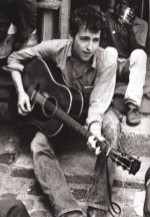|
Book
Review
Bringing it all back home
Chronicles,
Volume One
Simon and Schuster
 In
anticipation of his long-awaited autobiography, Dylan fans
had three fears: it would be as embarrassing as his ill-fated
fiction Tarantula (1966); it would be ghosted and inauthentic;
or, perhaps worst of all, it would be a dud. The good news
for Bobcats is that every line of Chronicles, (volume one,
two more to follow) reverberates with the marrow-shaking snarl
of the mesmerising American voice that first signed up with
Columbia records in New York City in 1961. In
anticipation of his long-awaited autobiography, Dylan fans
had three fears: it would be as embarrassing as his ill-fated
fiction Tarantula (1966); it would be ghosted and inauthentic;
or, perhaps worst of all, it would be a dud. The good news
for Bobcats is that every line of Chronicles, (volume one,
two more to follow) reverberates with the marrow-shaking snarl
of the mesmerising American voice that first signed up with
Columbia records in New York City in 1961.
In the
commercialised world of early Sixties American music, young
Robert Allen Zimmerman (aka Elston Gunn, aka Robert Allyn
and finally aka Bob Dylan) was a revolution. "What I
was playing at the time," he writes, "were hard-lipped
folksongs with fire and brimstone servings, and you didn't
need to take polls to know that they didn't match up with
anything on the radio."
Born in
Duluth, Minnesota in 1941, the son of respectable midwesterners,
the Zimmerman boy grew up in a place of "violent storms
that always seemed to be coming straight at you and merciless
howling winds off the big black mysterious lake". There's
nowhere that's more American. Lindbergh came from out of this
north country. So did F Scott Fitzgerald, Sinclair Lewis and
Eddie Cochran. Dylan identifies strongly with these "adventurers,
prophets, writers and musicians".
The magical
opening pages of Chronicles are a star-struck homage to the
Neal Cassady generation. On the one occasion Dylan hangs out
with Bono they drink a crate of Guinness, discuss fame and
swap Kerouac quotations into the night.
Was he
fazed by the snow-packed arteries of the city? Was he, hell!
"I could transcend the limitations," he writes.
And he did. "Blowin' in the Wind", "Desolation
Row", "Tangled Up in Blue", "Don't Think
Twice", "It's All Right", "A Hard Rain's
A-Gonna Fall", "Just Like A Woman", "Mr
Tambourine Man" and "The Times They Are A-Changin"
- these are some of the songs that set him apart from his
generation, and guarantee an immortal place in our hearts
and minds. "I'd either drive people away," he writes,
"or they'd come in closer to see what it was all about.
There was no in between."
That's
the story he tells here - and the price he paid for following
his boho muse. The evocative long second and third sections
of Chronicles take the reader up to Woodstock and beyond to
the point where Dylan is sick of the whole business, sick
of fame, "sick of the way my lyrics had been extrapolated,
sick of being America's media-licensed "outlaw"
".
There
are plenty of important details missing from this memoir.
The five chapters do not amount to a formal autobiography,
more a Kerouac-esque riff on some formative moments. After
his relationship with Suze Rotolo and, briefly, Joan Baez,
we are never, for instance, given any hard facts about the
women he refers to as "wife". But in place of conventional
chapter and verse - and why would you expect Dylan to be run-of-the-mill?
- the reader gets a candid account of his battle with his
ageing self ("my live performances never seemed to capture
the inner spirit of the songs") and his lonely, obsessive
quest to reconnect artistically with his youthful genius.
Dylan writes: "There was a missing person inside myself
and I needed to find him." He is frank about his decline,
admitting that at times he was barely a notch above "a
club act".
 If
you are looking for a text that will decode the thrilling
enigmas of his songs, this book is not for you. It's a bravura
performance with smoke and mirrors. And all the time he is
trying to find the literal and creative momentum to write
songs. The Fifties beat spirit of the restless Kerouac is
Dylan's inheritance, and in his quest for what Ginsberg called
the "hydrogen jukebox world" he would occasionally
stumble into the "reality of a more brilliant dimension"
- the folk song, which was "all I needed to exist". If
you are looking for a text that will decode the thrilling
enigmas of his songs, this book is not for you. It's a bravura
performance with smoke and mirrors. And all the time he is
trying to find the literal and creative momentum to write
songs. The Fifties beat spirit of the restless Kerouac is
Dylan's inheritance, and in his quest for what Ginsberg called
the "hydrogen jukebox world" he would occasionally
stumble into the "reality of a more brilliant dimension"
- the folk song, which was "all I needed to exist".
Chronicles
is occasionally close to self-parody but still incredibly
quotable in a read-aloud-to-your-friends sort of way. Just
as you are about to lose patience with the American rock star's
Mount Helen size ego, he reminds you that he's Dylan, and
finds his groove. Then you realise why Dylan will always be
part of the unofficial soundtrack of all our lives. Chronicles
takes its place next to On the Road and Guthrie's Bound for
Glory as an essential record of an American artist's manifest
destiny.
This
review was first published in The Guardian
Copyright
(R) thedailystar.net 2004
| 